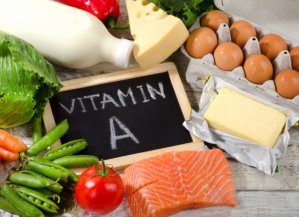 Lack of dietary vitamin A increases the risk of skin infections and acne. Science has known for a long time that creams with synthetic vitamin A can be used against various skin problems, yet they do not know how vitamin A really works. Now, a study conducted by scientists from UT Southwestern Medical Center in Texas, USA, reveals the underlying mechanisms by identifying a bactericidal skin protein that requires vitamin A in order to work. But what kind of vitamin is vitamin A really? When does it work optimally? And is there in fact vitamin A in carrots?
Lack of dietary vitamin A increases the risk of skin infections and acne. Science has known for a long time that creams with synthetic vitamin A can be used against various skin problems, yet they do not know how vitamin A really works. Now, a study conducted by scientists from UT Southwestern Medical Center in Texas, USA, reveals the underlying mechanisms by identifying a bactericidal skin protein that requires vitamin A in order to work. But what kind of vitamin is vitamin A really? When does it work optimally? And is there in fact vitamin A in carrots?
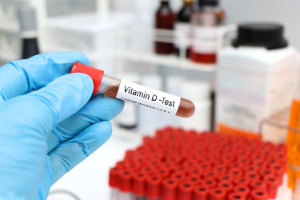 Melanoma is a type of malignant skin cancer that spreads rapidly. Being vitamin D-deficient doubles the risk of dying of the disease, according to a Spanish study that was presented at the European Academy of Dermatology and Venereology congress. It is commonly known that sunburns, which one should generally avoid, increase the risk of contracting skin cancer. But we must not forget that the summer sun is our main source of vitamin D and at our latitude, it necessary to take a vitamin D supplement in the wintertime. People who avoid the sun or have difficulty with synthesizing vitamin D in their skin should take a supplement all year round.
Melanoma is a type of malignant skin cancer that spreads rapidly. Being vitamin D-deficient doubles the risk of dying of the disease, according to a Spanish study that was presented at the European Academy of Dermatology and Venereology congress. It is commonly known that sunburns, which one should generally avoid, increase the risk of contracting skin cancer. But we must not forget that the summer sun is our main source of vitamin D and at our latitude, it necessary to take a vitamin D supplement in the wintertime. People who avoid the sun or have difficulty with synthesizing vitamin D in their skin should take a supplement all year round.
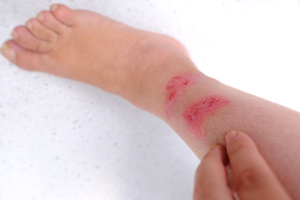 Poor wound healing, a somewhat common and well-known problem, especially among hospital patients, is associated with huge health costs. Proper wound healing is contingent upon on the presence of different nutrients, and it appears that the ratio between omega-3 and omega-6 fatty acids is particularly important. This was demonstrated in a new study of rats, where higher intake of omega-3 at the expense of omega-6 turned out to have the best effect on the formation of new blood vessels, increased collagen synthesis, and faster wound healing. In the study, which is published in Nutrients, the authors look closer at the fact that modern diets typically contain too much omega-6 and too little omega-3, and this contributes to problems such as cardiovascular disease, overweight, diabetes, and other lifestyle diseases.
Poor wound healing, a somewhat common and well-known problem, especially among hospital patients, is associated with huge health costs. Proper wound healing is contingent upon on the presence of different nutrients, and it appears that the ratio between omega-3 and omega-6 fatty acids is particularly important. This was demonstrated in a new study of rats, where higher intake of omega-3 at the expense of omega-6 turned out to have the best effect on the formation of new blood vessels, increased collagen synthesis, and faster wound healing. In the study, which is published in Nutrients, the authors look closer at the fact that modern diets typically contain too much omega-6 and too little omega-3, and this contributes to problems such as cardiovascular disease, overweight, diabetes, and other lifestyle diseases.
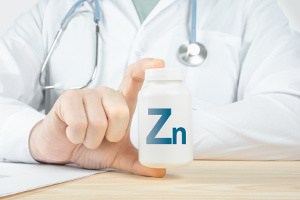 Over the past decades, it has been common practice to use zinc in creams and salves for treating various skin disorders. Zinc has wound-healing, antibiotic, and anti-inflammatory properties that make it useful for such purposes. In a review article that is published in International Journal of Molecular Sciences, the authors look closer at zinc’s role in skin health. They also look at whether zinc supplementation may positively affect eczema, acne, psoriasis, herpes, and other skin diseases. The authors also address the fact that around one third of the world’s population is zinc-deficient.
Over the past decades, it has been common practice to use zinc in creams and salves for treating various skin disorders. Zinc has wound-healing, antibiotic, and anti-inflammatory properties that make it useful for such purposes. In a review article that is published in International Journal of Molecular Sciences, the authors look closer at zinc’s role in skin health. They also look at whether zinc supplementation may positively affect eczema, acne, psoriasis, herpes, and other skin diseases. The authors also address the fact that around one third of the world’s population is zinc-deficient.
 Having healthy-looking hair means a lot to most people. Hair that splits at the ends, hair loss, and other hair problems may be caused by stress, hormone changes, and numerous other factors. In this article, we will take a closer look at the diet and its impact on hair health, and we will look at available studies of protein, iron, zinc, selenium, silica, B vitamins, vitamin D and vitamin A. The fact is, we need plenty of these nutrients in a form that the body can absorb and utilize. On the other hand, getting too much can do more harm than good, according to an article in Dermatology Practical & Conceptual, in which the author has analyzed the available research.
Having healthy-looking hair means a lot to most people. Hair that splits at the ends, hair loss, and other hair problems may be caused by stress, hormone changes, and numerous other factors. In this article, we will take a closer look at the diet and its impact on hair health, and we will look at available studies of protein, iron, zinc, selenium, silica, B vitamins, vitamin D and vitamin A. The fact is, we need plenty of these nutrients in a form that the body can absorb and utilize. On the other hand, getting too much can do more harm than good, according to an article in Dermatology Practical & Conceptual, in which the author has analyzed the available research.
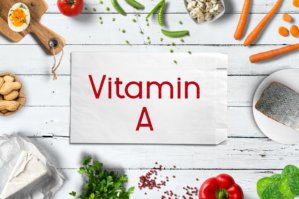 Those with a higher dietary intake of vitamin A than what is officially recommended are 17 percent less likely to develop the second-most common skin cancer compared with those who get limited quantities of the nutrient, according to a study from Brown University in the USA. Beware that vitamin A is found in different forms in various foods and that one of these forms (retinol) can be overdosed.
Those with a higher dietary intake of vitamin A than what is officially recommended are 17 percent less likely to develop the second-most common skin cancer compared with those who get limited quantities of the nutrient, according to a study from Brown University in the USA. Beware that vitamin A is found in different forms in various foods and that one of these forms (retinol) can be overdosed.
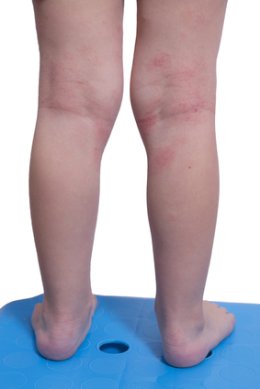 Fewer children have eczema around the age of 12 months if their mothers had higher levels of a particular B vitamin during pregnancy, according to a new study from the University of Southampton.
Fewer children have eczema around the age of 12 months if their mothers had higher levels of a particular B vitamin during pregnancy, according to a new study from the University of Southampton.
 Considerably fewer cases of melanoma are found among people who take vitamin D supplements regularly compared with those who don’t. This was demonstrated in a new Finnish study that is published in Melanoma Research. The study supports earlier research that shows that lack of vitamin D doubles your risk of dying of melanoma.
Considerably fewer cases of melanoma are found among people who take vitamin D supplements regularly compared with those who don’t. This was demonstrated in a new Finnish study that is published in Melanoma Research. The study supports earlier research that shows that lack of vitamin D doubles your risk of dying of melanoma.
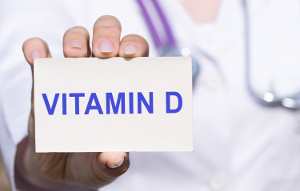 Photodynamic therapy is a kind of light therapy that is used to treat skin cancer, psoriasis, and other skin diseases. According to a review article published in Nutrients, vitamin D supplementation can improve the outcome of the treatment. In fact, vitamin D appears to have several positive effects on skin health. Taken in large doses, the vitamin can even repair skin damage caused by sunburns.
Photodynamic therapy is a kind of light therapy that is used to treat skin cancer, psoriasis, and other skin diseases. According to a review article published in Nutrients, vitamin D supplementation can improve the outcome of the treatment. In fact, vitamin D appears to have several positive effects on skin health. Taken in large doses, the vitamin can even repair skin damage caused by sunburns.
- here is a check list of typical signs and diseases
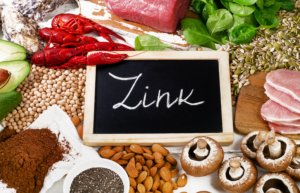 An estimated two billion people worldwide lack zinc. The essential trace element is involved in more than 1,000 different enzyme processes, besides being a powerful antioxidant that protects the body’s cells. Even minor zinc deficiencies can lead to impaired digestion, infections, skin problems, fatigue, impaired fertility, and DNA damage. Such deficiencies can eventually increase the risk of cancer and other diseases. People with unhealthy diets, vegetarians, vegans, older people, and pregnant and breastfeeding women are at particular risk of lacking zinc. Even if your diet provides sufficient amounts of zinc, different factors can affect the uptake and utilization of the nutrient, thereby increasing your body’s actual need.
An estimated two billion people worldwide lack zinc. The essential trace element is involved in more than 1,000 different enzyme processes, besides being a powerful antioxidant that protects the body’s cells. Even minor zinc deficiencies can lead to impaired digestion, infections, skin problems, fatigue, impaired fertility, and DNA damage. Such deficiencies can eventually increase the risk of cancer and other diseases. People with unhealthy diets, vegetarians, vegans, older people, and pregnant and breastfeeding women are at particular risk of lacking zinc. Even if your diet provides sufficient amounts of zinc, different factors can affect the uptake and utilization of the nutrient, thereby increasing your body’s actual need.
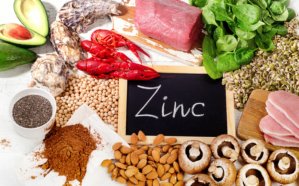 Our ability to absorb zinc is reduced with age, and many older people lack zinc, even though there is plenty of zinc in the diet they eat. The trace element is involved in over 1,000 enzyme processes and is also an important antioxidant that protects our cells. Even minor zinc deficiencies can speed up ageing processes and contribute to skin and hair problems, infections such as bladder infections, chronic inflammation, elevated blood pressure, cancer, and other diseases. People with unhealthy diets, vegetarians, vegans, and older people are at particularly vulnerable. Certain types of medicine that many seniors take can also increase the risk of a zinc deficiency.
Our ability to absorb zinc is reduced with age, and many older people lack zinc, even though there is plenty of zinc in the diet they eat. The trace element is involved in over 1,000 enzyme processes and is also an important antioxidant that protects our cells. Even minor zinc deficiencies can speed up ageing processes and contribute to skin and hair problems, infections such as bladder infections, chronic inflammation, elevated blood pressure, cancer, and other diseases. People with unhealthy diets, vegetarians, vegans, and older people are at particularly vulnerable. Certain types of medicine that many seniors take can also increase the risk of a zinc deficiency.
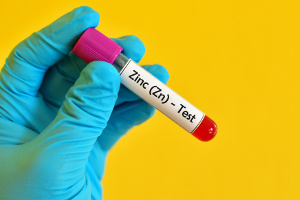 Zinc supplements have been given to patients with acne for years because of the anti-inflammatory properties of the nutrient. Still, it remains unclear whether zinc also helps treat other inflammatory skin diseases. Therefore, a group of scientists wanted to look closer at this and they discovered that zinc supplementation may be useful in the treatment of atopic dermatitis and diaper rash. Local treatment with zinc salve may also help.
Zinc supplements have been given to patients with acne for years because of the anti-inflammatory properties of the nutrient. Still, it remains unclear whether zinc also helps treat other inflammatory skin diseases. Therefore, a group of scientists wanted to look closer at this and they discovered that zinc supplementation may be useful in the treatment of atopic dermatitis and diaper rash. Local treatment with zinc salve may also help.
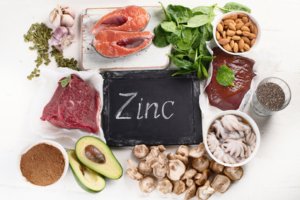 Our skin is among the body’s organs that contains the most zinc, and the trace element is of vital importance to the formation and protection of skin cells. A zinc deficiency can therefore contribute to poor wound healing, sensitive skin, acne, eczema and other skin disorders, and hair loss, according to a new study that is published in the scientific journal Nutrients. Although clinical zinc deficiencies are rare in our part of the world, sub-clinical deficiencies are rather common. For instance, vegetarians, pregnant and breastfeeding women, and older people are particularly vulnerable. A large intake of sugar, calcium, and alcohol, the use of birth control pills and several types of medicine, plus certain diseases and other factors can also increase your risk of becoming zinc-deficient.
Our skin is among the body’s organs that contains the most zinc, and the trace element is of vital importance to the formation and protection of skin cells. A zinc deficiency can therefore contribute to poor wound healing, sensitive skin, acne, eczema and other skin disorders, and hair loss, according to a new study that is published in the scientific journal Nutrients. Although clinical zinc deficiencies are rare in our part of the world, sub-clinical deficiencies are rather common. For instance, vegetarians, pregnant and breastfeeding women, and older people are particularly vulnerable. A large intake of sugar, calcium, and alcohol, the use of birth control pills and several types of medicine, plus certain diseases and other factors can also increase your risk of becoming zinc-deficient.
 Lack of dietary vitamin A increases the risk of skin infections and acne. Science has known for a long time that creams with synthetic vitamin A can be used against various skin problems, yet they do not know how vitamin A really works. Now, a study conducted by scientists from UT Southwestern Medical Center in Texas, USA, reveals the underlying mechanisms by identifying a bactericidal skin protein that requires vitamin A in order to work. But what kind of vitamin is vitamin A really? When does it work optimally? And is there in fact vitamin A in carrots?
Lack of dietary vitamin A increases the risk of skin infections and acne. Science has known for a long time that creams with synthetic vitamin A can be used against various skin problems, yet they do not know how vitamin A really works. Now, a study conducted by scientists from UT Southwestern Medical Center in Texas, USA, reveals the underlying mechanisms by identifying a bactericidal skin protein that requires vitamin A in order to work. But what kind of vitamin is vitamin A really? When does it work optimally? And is there in fact vitamin A in carrots?







 Magnesium is important for numerous physiological functions. In a new review article published in Nutrients, researchers have looked at the relation between the body’s magnesium levels and a variety of different ageing markers. Also, they hypothesize that optimal intake of magnesium throughout life is an easy and inexpensive way to obtain healthy ageing.
Magnesium is important for numerous physiological functions. In a new review article published in Nutrients, researchers have looked at the relation between the body’s magnesium levels and a variety of different ageing markers. Also, they hypothesize that optimal intake of magnesium throughout life is an easy and inexpensive way to obtain healthy ageing.

 Melanoma is a type of malignant skin cancer that spreads rapidly. Being vitamin D-deficient doubles the risk of dying of the disease, according to a Spanish study that was presented at the European Academy of Dermatology and Venereology congress. It is commonly known that sunburns, which one should generally avoid, increase the risk of contracting skin cancer. But we must not forget that the summer sun is our main source of vitamin D and at our latitude, it necessary to take a vitamin D supplement in the wintertime. People who avoid the sun or have difficulty with synthesizing vitamin D in their skin should take a supplement all year round.
Melanoma is a type of malignant skin cancer that spreads rapidly. Being vitamin D-deficient doubles the risk of dying of the disease, according to a Spanish study that was presented at the European Academy of Dermatology and Venereology congress. It is commonly known that sunburns, which one should generally avoid, increase the risk of contracting skin cancer. But we must not forget that the summer sun is our main source of vitamin D and at our latitude, it necessary to take a vitamin D supplement in the wintertime. People who avoid the sun or have difficulty with synthesizing vitamin D in their skin should take a supplement all year round. Poor wound healing, a somewhat common and well-known problem, especially among hospital patients, is associated with huge health costs. Proper wound healing is contingent upon on the presence of different nutrients, and it appears that the ratio between omega-3 and omega-6 fatty acids is particularly important. This was demonstrated in a new study of rats, where higher intake of omega-3 at the expense of omega-6 turned out to have the best effect on the formation of new blood vessels, increased collagen synthesis, and faster wound healing. In the study, which is published in Nutrients, the authors look closer at the fact that modern diets typically contain too much omega-6 and too little omega-3, and this contributes to problems such as cardiovascular disease, overweight, diabetes, and other lifestyle diseases.
Poor wound healing, a somewhat common and well-known problem, especially among hospital patients, is associated with huge health costs. Proper wound healing is contingent upon on the presence of different nutrients, and it appears that the ratio between omega-3 and omega-6 fatty acids is particularly important. This was demonstrated in a new study of rats, where higher intake of omega-3 at the expense of omega-6 turned out to have the best effect on the formation of new blood vessels, increased collagen synthesis, and faster wound healing. In the study, which is published in Nutrients, the authors look closer at the fact that modern diets typically contain too much omega-6 and too little omega-3, and this contributes to problems such as cardiovascular disease, overweight, diabetes, and other lifestyle diseases. Over the past decades, it has been common practice to use zinc in creams and salves for treating various skin disorders. Zinc has wound-healing, antibiotic, and anti-inflammatory properties that make it useful for such purposes. In a review article that is published in International Journal of Molecular Sciences, the authors look closer at zinc’s role in skin health. They also look at whether zinc supplementation may positively affect eczema, acne, psoriasis, herpes, and other skin diseases. The authors also address the fact that around one third of the world’s population is zinc-deficient.
Over the past decades, it has been common practice to use zinc in creams and salves for treating various skin disorders. Zinc has wound-healing, antibiotic, and anti-inflammatory properties that make it useful for such purposes. In a review article that is published in International Journal of Molecular Sciences, the authors look closer at zinc’s role in skin health. They also look at whether zinc supplementation may positively affect eczema, acne, psoriasis, herpes, and other skin diseases. The authors also address the fact that around one third of the world’s population is zinc-deficient.
 Those with a higher dietary intake of vitamin A than what is officially recommended are 17 percent less likely to develop the second-most common skin cancer compared with those who get limited quantities of the nutrient, according to a study from Brown University in the USA. Beware that vitamin A is found in different forms in various foods and that one of these forms (retinol) can be overdosed.
Those with a higher dietary intake of vitamin A than what is officially recommended are 17 percent less likely to develop the second-most common skin cancer compared with those who get limited quantities of the nutrient, according to a study from Brown University in the USA. Beware that vitamin A is found in different forms in various foods and that one of these forms (retinol) can be overdosed. Fewer children have eczema around the age of 12 months if their mothers had higher levels of a particular B vitamin during pregnancy, according to a new study from the University of Southampton.
Fewer children have eczema around the age of 12 months if their mothers had higher levels of a particular B vitamin during pregnancy, according to a new study from the University of Southampton. Considerably fewer cases of melanoma are found among people who take vitamin D supplements regularly compared with those who don’t. This was demonstrated in a new Finnish study that is published in Melanoma Research. The study supports earlier research that shows that lack of vitamin D doubles your risk of dying of melanoma.
Considerably fewer cases of melanoma are found among people who take vitamin D supplements regularly compared with those who don’t. This was demonstrated in a new Finnish study that is published in Melanoma Research. The study supports earlier research that shows that lack of vitamin D doubles your risk of dying of melanoma. Photodynamic therapy is a kind of light therapy that is used to treat skin cancer, psoriasis, and other skin diseases. According to a review article published in Nutrients, vitamin D supplementation can improve the outcome of the treatment. In fact, vitamin D appears to have several positive effects on skin health. Taken in large doses, the vitamin can even repair skin damage caused by sunburns.
Photodynamic therapy is a kind of light therapy that is used to treat skin cancer, psoriasis, and other skin diseases. According to a review article published in Nutrients, vitamin D supplementation can improve the outcome of the treatment. In fact, vitamin D appears to have several positive effects on skin health. Taken in large doses, the vitamin can even repair skin damage caused by sunburns.
 Our ability to absorb zinc is reduced with age, and many older people lack zinc, even though there is plenty of zinc in the diet they eat. The trace element is involved in over 1,000 enzyme processes and is also an important antioxidant that protects our cells. Even minor zinc deficiencies can speed up ageing processes and contribute to skin and hair problems, infections such as bladder infections, chronic inflammation, elevated blood pressure, cancer, and other diseases. People with unhealthy diets, vegetarians, vegans, and older people are at particularly vulnerable. Certain types of medicine that many seniors take can also increase the risk of a zinc deficiency.
Our ability to absorb zinc is reduced with age, and many older people lack zinc, even though there is plenty of zinc in the diet they eat. The trace element is involved in over 1,000 enzyme processes and is also an important antioxidant that protects our cells. Even minor zinc deficiencies can speed up ageing processes and contribute to skin and hair problems, infections such as bladder infections, chronic inflammation, elevated blood pressure, cancer, and other diseases. People with unhealthy diets, vegetarians, vegans, and older people are at particularly vulnerable. Certain types of medicine that many seniors take can also increase the risk of a zinc deficiency. Zinc supplements have been given to patients with acne for years because of the anti-inflammatory properties of the nutrient. Still, it remains unclear whether zinc also helps treat other inflammatory skin diseases. Therefore, a group of scientists wanted to look closer at this and they discovered that zinc supplementation may be useful in the treatment of atopic dermatitis and diaper rash. Local treatment with zinc salve may also help.
Zinc supplements have been given to patients with acne for years because of the anti-inflammatory properties of the nutrient. Still, it remains unclear whether zinc also helps treat other inflammatory skin diseases. Therefore, a group of scientists wanted to look closer at this and they discovered that zinc supplementation may be useful in the treatment of atopic dermatitis and diaper rash. Local treatment with zinc salve may also help.
 "After about one week of taking the Q10 supplement I could feel a huge difference," says 23-year old Alan Piccini, who has been suffering from extreme fatigue and muscle aches ever since he was a child.
"After about one week of taking the Q10 supplement I could feel a huge difference," says 23-year old Alan Piccini, who has been suffering from extreme fatigue and muscle aches ever since he was a child. “Taking capsules with co-enzyme Q10 has freed me of the severe side effects of my cholesterol lowering medicine,” Mrs Franken explains.
“Taking capsules with co-enzyme Q10 has freed me of the severe side effects of my cholesterol lowering medicine,” Mrs Franken explains.